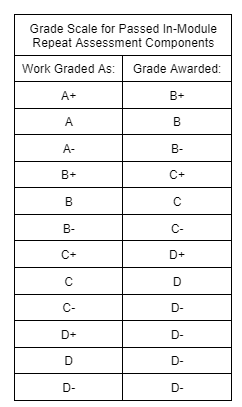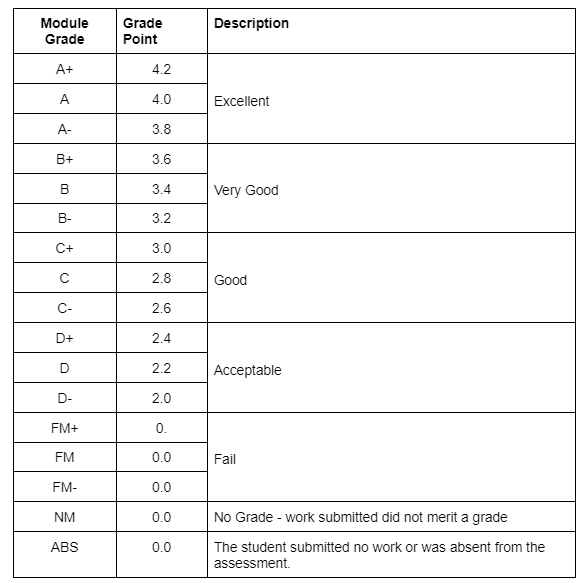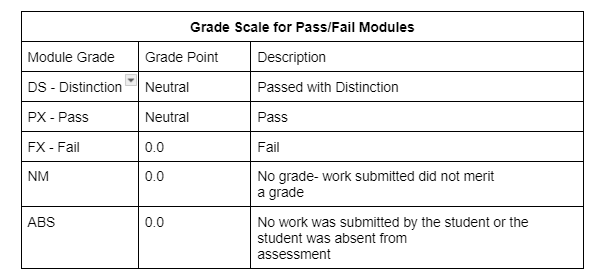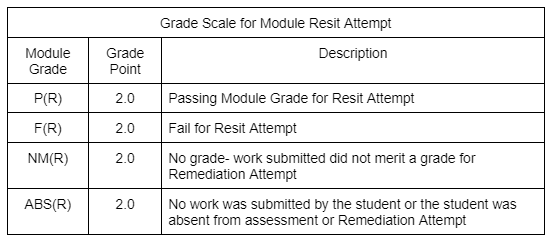The following regulations apply to the Assessment of modules in UCD:
4.4 The following regulations apply to individual modules. However, it may be appropriate,
notwithstanding the self-contained nature of modules, to group a number together for
the purposes of assessment or to permit the assessment for one module to be applied
to another where the learning outcomes are equivalent or complementary and where all
the relevant modules are contained within the same trimester or trimesters.
4.5 The assessment strategy for a module will, as far as practicable, be considered and
planned in relation to overall assessment load of the programmes in which the module
is specified. The assessment strategy will include one or more components of
assessment. A component of assessment may be a single assessment task (such as a
terminal written examination, a major essay or a project) or may comprise a number of
separate assessment tasks of a given type (such as a series of laboratory reports, tutorial
assessments or short tests).
4.6 A module should make use of an appropriate range of methods of assessment. Where
end-of-trimester examination is used as a means of assessment, an appropriate balance
between formal end-of-trimester examinations and in-trimester assessment should be
achieved.
4.7 In developing formative assessment, Module Coordinators shall ensure that students
have opportunities to:
a) self-monitor and/or learn from other students;
b) receive feedback; and
c) practice assessments, and see examples of unfamiliar tasks – e.g. software, virtual
learning environment (VLE) functionality, question type – prior to submission.
4.8 The assessment strategy for a module shall be specified and approved by the
responsible School or Board of Studies and shall be reviewed from time to time as
required by Academic Council. Assessment strategies may not be changed during the
course of the module unless the Vice Principal for Teaching and Learning in the relevant
College grants an exemption based on exceptional circumstances.
4.9 Participation may be an assessed component of a module where a clear assessment
methodology and set of assessment criteria is provided in advance to students; such
forms of assessment should be made explicit in the assessment strategy of the module.
Grades must not be awarded solely for attendance.
4.10 All teaching and assessment of modules within programmes leading to an academic
award of the University shall be in the English language, apart from the following
exceptions:
a) Irish modules, foreign language modules and any modules on a programme with a
significant foreign language curriculum specialisation.
b) Modules provided and assessed by another institution associated with a student
exchange or collaborative programme and approved by the relevant University
committee/board.
4.11 The volume of assessment should be appropriate to the learning outcomes and the
length of a written in-person or online terminal examination shall not exceed two hours.
In instances where the length of a written terminal examination must exceed two hours
to meet the requirements of a Professional, Statutory and Regulatory Body, this can be
approved by the Governing Board and must be detailed in the Module Descriptor. The
Academic Council or its relevant Committee may request a report of modules where the
terminal examination exceeds the permitted two hours.
4.12 Module Coordinators must ensure that records of assessment are kept in a safe,
accurate and comprehensive manner, in compliance with both established School
processes and the University’s retention policy and procedures.
4.13 Module Coordinators must enter component grades into University systems not later
than 20 working days (unless the Vice Principal for Teaching and Learning in the relevant
College grants an exemption based on exceptional circumstances) after the assessment
submission for all work submitted within the time specified in the assessment strategy,
or the date specified by Academic Council or its relevant committee for the final
submission of grades for the trimester, whichever comes first.
4.14 A student is responsible for the academic integrity of any assessment they submit.
Module Coordinators shall take all appropriate steps to evaluate the academic integrity
of any assessment submitted by students. The Head of School shall ensure that robust
procedures in accordance with University policies and procedures are in place to address
any alleged breaches of academic integrity.



.png)


